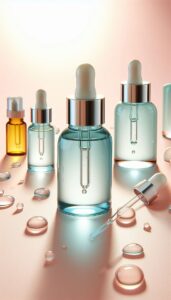Every woman dreams of radiant, healthy skin, but achieving that goal starts with one essential step: crafting the perfect skincare routine. Building an effective regimen can feel overwhelming with so many products and advice out there, but when tailored to your unique skin type, it becomes a transformative self-care ritual. Whether your skin is dry, oily, sensitive, or somewhere in between, understanding its needs is key to unlocking its full potential.
Skincare routines aren’t one-size-fits-all. Each skin type has specific characteristics that require different approaches. The beauty of a personalized routine lies in its ability to cater to these nuances, addressing individual concerns like acne, dryness, sensitivity, or signs of aging. By focusing on the science of skin health and incorporating proven ingredients, you can build a routine that not only enhances your complexion but also boosts your confidence.
The foundation of any skincare routine begins with cleansing. A cleanser removes dirt, oil, makeup, and environmental pollutants that accumulate on the skin throughout the day. For dry skin, a creamy, hydrating cleanser enriched with ingredients like ceramides and hyaluronic acid works wonders, helping to restore the skin’s natural moisture barrier. Oily or acne-prone skin benefits from gel-based cleansers that include salicylic acid or tea tree oil to control excess sebum and keep pores clear. Those with sensitive skin should opt for gentle, fragrance-free cleansers designed to soothe irritation without stripping the skin.
After cleansing, the next crucial step is toning. Toners often get overlooked, but they play a vital role in preparing the skin for subsequent products. A good toner balances the skin’s pH levels, removes any lingering residue, and hydrates the skin. Alcohol-free toners infused with soothing ingredients like chamomile, aloe vera, or rose water are ideal for sensitive skin. For oily or combination skin types, a toner containing witch hazel or niacinamide can help minimize pores and regulate oil production.
Hydration is the cornerstone of healthy skin, making moisturizers an indispensable part of any routine. Even oily skin needs hydration, as skipping this step can lead to overproduction of sebum and exacerbate acne. Lightweight, oil-free moisturizers work best for oily and combination skin, while richer, emollient creams are perfect for dry or mature skin. Sensitive skin types benefit from moisturizers containing minimal ingredients and no potential irritants, such as fragrances or artificial dyes. Key hydrating ingredients to look for include glycerin, hyaluronic acid, and ceramides, which help lock in moisture and strengthen the skin’s protective barrier.
Sunscreen is a non-negotiable part of any skincare routine. Daily sun protection shields the skin from harmful UV rays that cause premature aging, dark spots, and even skin cancer. Broad-spectrum sunscreens with an SPF of 30 or higher are recommended for maximum protection. For those with oily or acne-prone skin, lightweight, non-comedogenic formulas are ideal, while people with dry skin may prefer sunscreens with added moisturizing ingredients. Mineral-based sunscreens containing zinc oxide or titanium dioxide are a great choice for sensitive skin, as they are less likely to cause irritation.
Beyond these core steps, incorporating targeted treatments can address specific concerns. Serums are potent formulas packed with active ingredients that deliver results directly to the skin. Vitamin C serums, for example, brighten the complexion and combat free radicals, making them a great addition to any morning routine. Retinol, a derivative of vitamin A, is the gold standard for reducing fine lines, wrinkles, and acne, but it’s important to introduce it gradually, especially for sensitive skin. Hydrating serums with hyaluronic acid or peptides can provide an extra boost of moisture, while treatments containing benzoyl peroxide or salicylic acid can help manage breakouts.
Exfoliation is another essential component of a well-rounded routine, but it must be done carefully to avoid damaging the skin. Exfoliants remove dead skin cells, unclog pores, and promote cell turnover, leaving the skin smoother and more radiant. Chemical exfoliants, such as alpha-hydroxy acids (AHAs) like glycolic acid or lactic acid, are gentle yet effective for most skin types. Beta-hydroxy acids (BHAs), such as salicylic acid, are particularly beneficial for oily or acne-prone skin. Physical exfoliants, like scrubs, should be used sparingly, as they can be too abrasive, especially for sensitive or delicate skin.
Building a skincare routine also requires consistency and patience. While it’s tempting to try multiple products at once, introducing one new product at a time allows you to monitor how your skin reacts and prevents potential irritations. Skin typically takes about 28 days to renew itself, so give your routine at least a month before expecting visible results.
Finally, understanding the importance of lifestyle factors can enhance your skincare routine. Drinking plenty of water, eating a balanced diet rich in antioxidants, and managing stress contribute significantly to skin health. Quality sleep is equally crucial, as it allows the skin to repair and regenerate overnight. Pairing these habits with a tailored skincare routine creates a holistic approach to achieving and maintaining a radiant complexion.
Creating a skincare routine that caters to your unique skin type is an empowering journey of self-discovery. By understanding the science behind your skin’s needs and choosing the right products, you can transform your daily regimen into a self-care ritual that celebrates your natural beauty. With dedication and the right steps, glowing, healthy skin is within reach for every woman.





